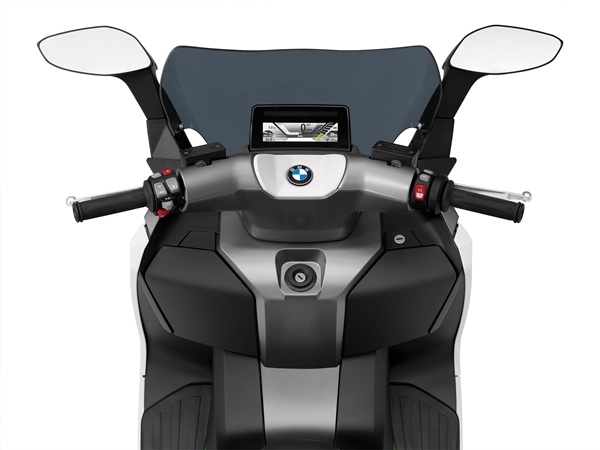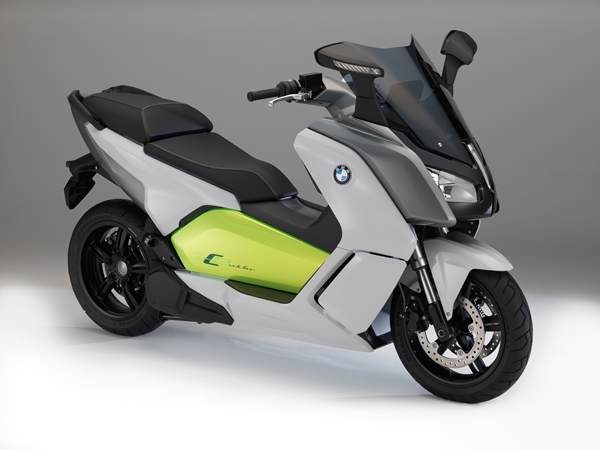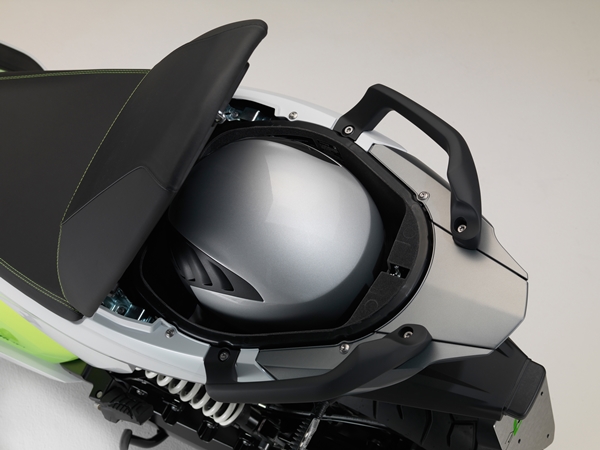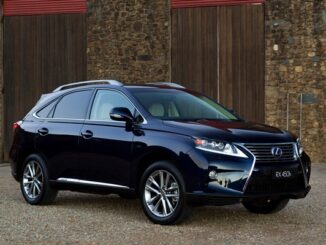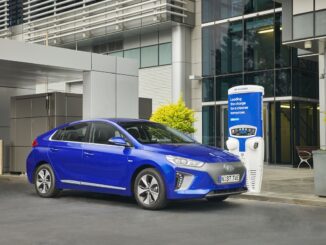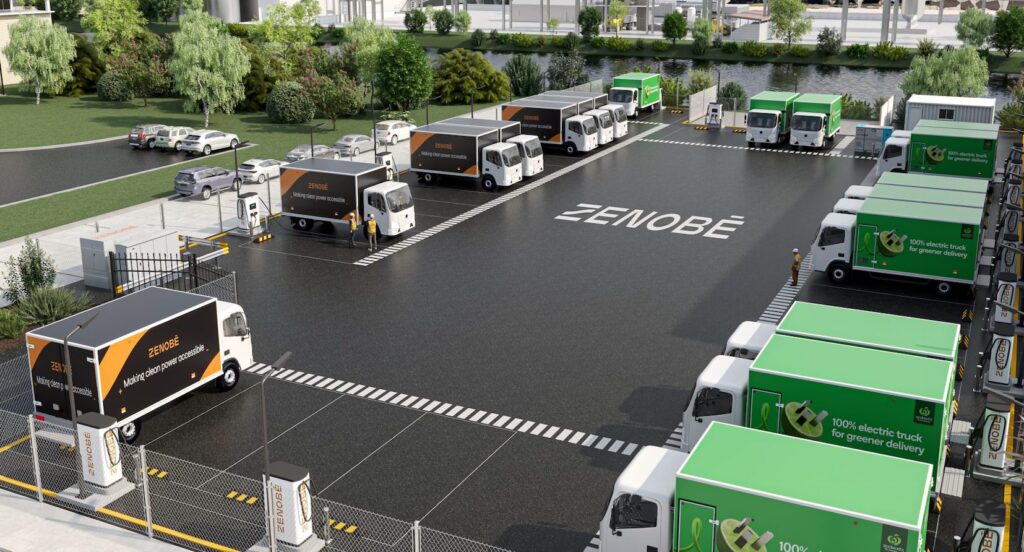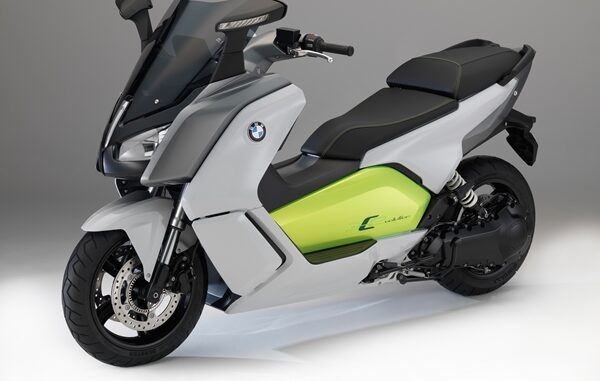
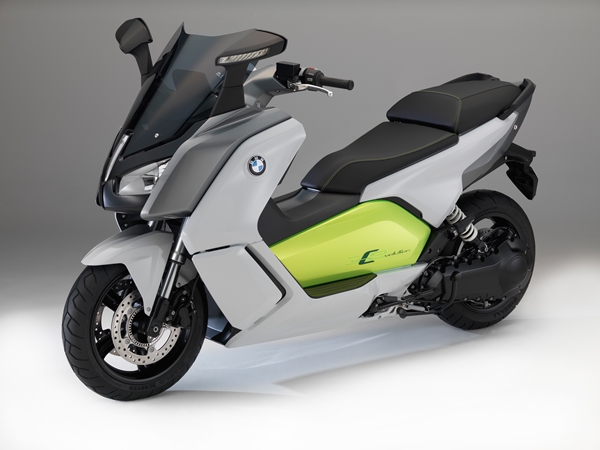
The arrival of the new C evolution marks the start of a new chapter in the urban mobility segment for BMW Motorrad. The two conventionally powered maxi scooter models – the C 600 Sport and C 650 GT – already succeed in combining the superb ride qualities of a motorcycle with the specific agility of a scooter and the design’s inherent comfort. The new electrically powered C evolution now goes even further by fusing riding fun and dynamism with the benefits of zero-emission performance to create a whole new experience on two wheels. In keeping with the BMW Group’s sustainability strategy, BMW Motorrad is taking a fully committed approach to electric mobility. As with BMW i, development of the C evolution revolved around creating a visionary vehicle concept offering maximum everyday practicality and an inspirational design.
Powerful drive unit with liquid-cooled electric motor and air-cooled high-voltage battery. Range of 100 kilometres (62 miles) under practical conditions.
The C evolution is powered by a drivetrain swing arm with liquid-cooled permanent magnet synchronous motor via a toothed belt and ring gearing. The rated power output is 11 kW (15 hp), with a peak output of 35 kW (47 hp). This enables the C evolution to achieve a top speed of 120 km/h (75 mph, electronically limited) and gives it better acceleration than some maxi scooters powered by engines with displacements of 600 cc or more. The generous 8 kWh capacity of the air-cooled lithium-ion high-voltage battery allows the two-wheeler to cover a range of up to 100 kilometres (62 miles) before it needs to be charged from any domestic mains supply. When plugged in to a standard 220V domestic socket with a 12A charge current, recharging fully from empty takes around 4 hours (with 220V / 16A = 3 h).
Intelligent recuperation and four ride modes ensure riding fun as well as efficiency.
BMW Motorrad has opted for a form of energy regeneration for the C evolution that has never been seen before on a single-track vehicle. Recuperation takes place automatically both when coasting with the throttle closed and when braking.
Riders of the C evolution can set their preferred mix of dynamic performance and efficiency by selecting from the four ride modes. In Road mode, for instance, they have at their disposal maximum acceleration, approximately 50 per cent energy regeneration when coasting and full regeneration when braking. In Eco Pro mode, meanwhile, acceleration and therefore energy consumption are restricted, while the maximum possible amount of energy is recuperated. Sail mode suppresses recuperation while coasting, allowing the C evolution to glide along virtually free of any braking effect when the throttle is released. And for an added touch of dynamism, Dynamic mode combines full accelerating power with a high degree of recuperation.
Supreme safety thanks to synergies with BMW Automobile.
As part of the BMW Group, BMW Motorrad was able to harness synergies with BMW Automobile during development of the C evolution. Besides adopting the same energy storage modules and electronic componentry used in the BMW i3, this was particularly beneficial for electrical safety, which is to passenger car standard. The C evolution is the first electrically powered two-wheeler to meet the ISO 26262 standard for functional safety and the ECE R100 standard governing high-voltage safety, both of which have been ratified by the leading carmakers.
As far as the chassis is concerned, the C evolution no longer has a main frame in the conventional sense. The central component here is the battery casing made from diecast aluminium, which has a steering head support made from steel tubing attached to it at the front and, at the rear, the single-sided swing arm as well as a rear frame, also made from steel tubing. The task of wheel suspension and damping is performed by an upside-down telehydraulic fork at the front and a spring strut mounted on the left at the rear. As on all vehicles from BMW Motorrad, the C evolution comes equipped with safety-boosting ABS together with powerful disc brakes as standard.
Torque Control Assist (TCA) for superior traction control.
The new C evolution is available with Torque Control Assist (TCA), which works in a similar way to the Automatic Stability Control feature on BMW motorcycles with combustion engines. TCA limits the motor’s torque depending on the slip at the rear wheel.
To ensure optimum controllability of the drive torque for the rider, the electric motor’s control electronics monitor the rear wheel speed and reduce the drive torque if a certain plausibility threshold is exceeded. TCA is a particularly useful aid for the rider when starting off and prevents uncontrolled spinning of the rear wheel on road surfaces with reduced grip (e.g. wet cobblestones).
The Torque Control Assist additionally serves to stop the rear wheel from skidding when a sharp rate of recuperation produces a correspondingly high level of drag torque, especially on slippery road surfaces.
Large TFT colour display and LED daytime running light.
A host of other features further underline the innovative character of the C evolution. It is equipped with a reversing aid, for instance, that enables easy manoeuvring at walking pace. There is also a first in the form of an LED daytime running light, which additionally dims to double as the sidelight. And for added comfort on cold days, there are heated handlebar grips.
A large TFT colour display in the instrument cluster offers a wealth of information. Apart from the current speed, the rider is also kept informed of data such as the average consumption in kWh/100 km, total power consumption, battery charge status in kWh, average speed, voltage of the on-board electrical system and the high-voltage system, as well as the remaining range in kilometres taking into account the selected ride mode. A bar graph furthermore indicates the current level of energy draw or regeneration.
Inspirational design.
Last but not least, the C evolution also charts new territory in terms of styling and colour scheme. Design-wise, the C evolution fits harmoniously into the BMW Motorrad family, while the colour combination of Light White non-metallic and Electric Green symbolises its ability to blend maximum eco-friendliness with superb dynamic performance.
The highlights at a glance:
Innovative electric drive system via drivetrain swing arm with liquid-cooled permanent magnet synchronous motor, toothed belt and ring gearing.
Rated power output 11 kW (homologated according to ECE R85) and 35 kW peak output.
Maximum torque 72 Nm (53 lb-ft).
Top speed 120 km/h (75 mph).
Acceleration 0 – 50 km/h (31 mph) in 2.7 s.
Acceleration 0 – 100 km/h (62 mph) in 6.2 s.
High range of 100 kilometres (62 miles) in practical operation.
4 ride modes available to choose from: Road, Eco Pro, Sail and Dynamic.
Reversing aid for supremely easy manoeuvring.
Torque Control Assist (TCA).
High-voltage battery with high capacity of 8 kWh and innovative air cooling.
Intelligent recuperation when coasting and when braking.
Recharged from the domestic mains supply.
Takes just 4 h to charge to 100 % capacity at 220V / 12A (220V / 16A = 3 h).
Synergies with BMW Automobile harnessed during development.
Electrical safety to passenger car standards.
Hybrid chassis with agile handling due to low centre of gravity.
Powerful braking system with ABS.
Large TFT colour display.
LED daytime running light and sidelight.
Inspirational colour scheme and design.

